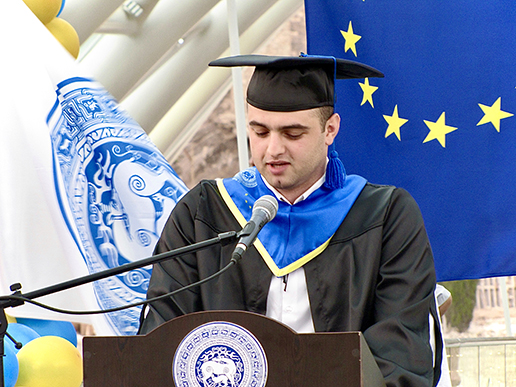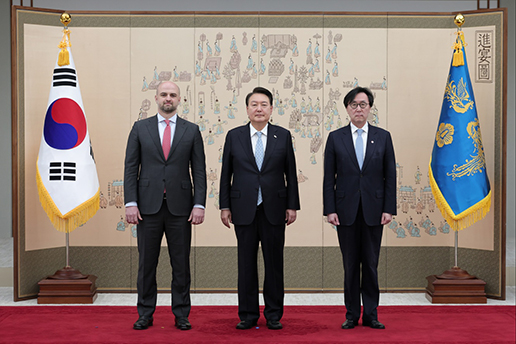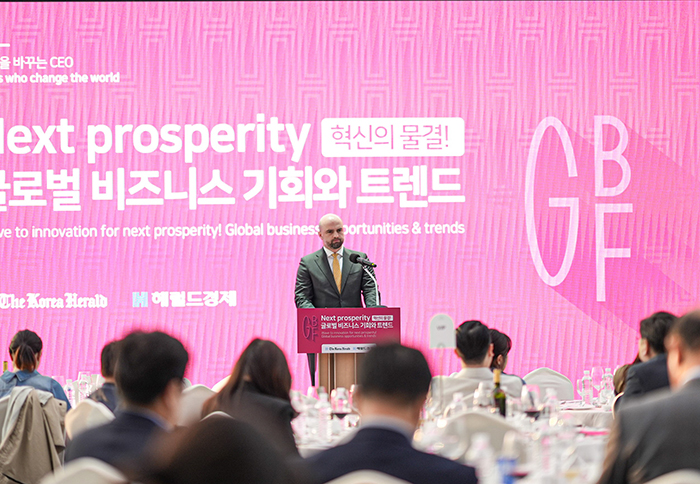.JPG)
Tarash graduated from Ivane Javakhishvili Tbilisi State University, Faculty of Law in 2007, with a Bachelor’s degree in Law (International Law) and from the IES English Language Program of the Institute for European Studies at TSU with a Master’s degree in European Studies.
A graduate of TSU, he began his career in the Ministry of Foreign Affairs of Georgia. Before becoming Ambassador to the Republic of Korea, he held the positions of Third, Second and First Secretary of the Department for International Organizations; he worked as an advisor in the Embassy of Georgia to the Republic of Poland, as well as in the Embassy of Georgia to the Republic of Austria and in the Permanent Representation of Georgia to the OSCE and Other International Organizations in Vienna; in 2019-2022, he served as the Head of the Department for Trade Development and International Economic Relations of the Ministry of Economy and Sustainable Development of Georgia.
What made Tarash Papaskua interested in Tbilisi State University in general and the Institute for European Studies (IES) in particular? To what extent did the knowledge and contacts he gained at Tbilisi State University contribute to his career advancement? Tarash Papaskua will answer these and other questions.
- In 2003, I was in the United States on an exchange program, where I finished my secondary education. I wanted to continue my studies and get a higher education in the U.S., for which I had all the prerequisites. However, due to various circumstances, I had to pursue my higher education in Georgia. Before the entrance exams, as a newcomer from America, I had a clear interest in the field of international law and I did not even think about any other choice - Tbilisi State University is really distinguished by its history and tradition. In this regard, its foreign language department was in line with my interests.
It was at the university that my desire to promote Georgia’s integration into the European space was formed and strengthened. This is what connected me with the Institute for European Studies and its two-year, English-language Master’s program, which proved to be very interesting and meaningful for me. I am glad to see that the Institute for European Studies continues to operate successfully and has since added a number of programs and modules, including a Ph.D. I believe that the Institute makes a great contribution to strengthening European values for our society.
connected me with the Institute for European Studies and its two-year, English-language Master’s program, which proved to be very interesting and meaningful for me. I am glad to see that the Institute for European Studies continues to operate successfully and has since added a number of programs and modules, including a Ph.D. I believe that the Institute makes a great contribution to strengthening European values for our society.
The knowledge acquired at TSU, first at the Faculty of Law and later at the Institute for European Studies, gave me a successful start to my career and contributed greatly to my professional development. I graduated from the two-year master’s program with honors. In general, I believe that a thorough education in a specific field and the subsequent opportunity to put this knowledge into practice is a prerequisite for success.
Discussion as a cognitive process and international practice
I was always active in my studies. Whether or not I knew the exact answer at that moment, I was never afraid to start a discussion because a dynamic, interactive learning process seemed attractive to me. I think that the stage of secondary or higher education - the cognitive process, analyzing the mistakes of others or one’s own, forming the final, correct position - is a luxury that is not always given to us in life. That’s why we should productively use this opportunity given to us in the educational institution.
When I was a student, the university had very interesting and extensive exchange programs, and today, as far as I know, it has even more. While studying at TSU, I studied international law and participated in mock trials at Leiden University in the Netherlands. It was a really interesting experience for the four participating students from our group.
I also had the opportunity to do an internship in the Georgian Government Administration, in the office of Gocha Lortkipanidze, the advisor to the then Prime Minister of Georgia, the former Minister of Justice of Georgia and the sitting judge of the International Criminal Court in The Hague.
The University and the Institute for European Studies were particularly important for establishing contacts and further relations. We had daily contact with academics of the highest rank and experienced, practicing civil servants. who at that time held high diplomatic positions in the Ministry of Foreign Affairs, and later contributed greatly to the launch of my diplomatic career. I would like to express my sincere gratitude to my former lecturers, with most of whom I now enjoy a personal friendship and professional relationship.
Ambassador’s future plans and TSU
 The university is my home. Here, I would like to recall with great pride and satisfaction my work as a guest lecturer of English language at the undergraduate level of International Relations at TSU in 2012-2014. I will always have a positive attitude toward TSU and wish to cooperate with it. Although it is not possible at this stage as an academic activity, but in the current format, it is possible to popularize the university’s educational programs and provide some support, for which I will spare no effort.
The university is my home. Here, I would like to recall with great pride and satisfaction my work as a guest lecturer of English language at the undergraduate level of International Relations at TSU in 2012-2014. I will always have a positive attitude toward TSU and wish to cooperate with it. Although it is not possible at this stage as an academic activity, but in the current format, it is possible to popularize the university’s educational programs and provide some support, for which I will spare no effort.
Last year, we celebrated the 30th anniversary of the establishment of diplomatic relations between Georgia and Korea. During this period, very fruitful and close relations have been established between the two countries, to which my predecessors have made a great contribution.
We have great potential for deepening partnership relations between Georgia and Korea in all directions. This is based on our common values and democratic principles. My desire and goal is to make a significant contribution to this work. I would like to highlight trade and economic relations, cooperation in investment, technology and innovation, as well as potential in environmental protection, renewable energy, education, cultural exchanges and tourism. Together with the National Wine Agency of Georgia, the Embassy is also involved in the promotion of Georgian wine in Korea. In this regard, Georgia, recognized in the world as the homeland of wine, with its 8000 years of continuous and unique winemaking history, has the greatest potential in the Korean market.
Korea’s economic development has been remarkably impressive in recent decades. The Republic of Korea, which ranks fourth in Asia in terms of economic development after China, Japan and India, is a strategically important country and market for Georgia, and we would like to sign a free trade agreement with Korea in the near future. Important preparatory work has already been done in this direction, and I think we will be able to start official negotiations next year.
We are actively working on the possibility of visa-free travel to Korea for Georgian citizens (I mean ordinary passports) and I hope that this will be possible in the near future.
The field of education, in particular, cooperation between universities, promotion of scientific and student exchange programs, is another main direction of our work. The Embassy played an active role and contributed to the organization of the Georgian-Azerbaijani-Korean scientific and archaeological conference at TSU on June 19-20, which was attended by more than 30 professors and scientists from the three countries.
direction of our work. The Embassy played an active role and contributed to the organization of the Georgian-Azerbaijani-Korean scientific and archaeological conference at TSU on June 19-20, which was attended by more than 30 professors and scientists from the three countries.
As for the TSU Institute for European Studies (IES), which was established by the European Union in 2007, there are currently 6 programs operating here: 1. Jean Monnet Georgian-language undergraduate program in European Studies with English components; 2. English-language master’s program in European Studies; 3. English-language doctoral program in European Studies; 4. English-language regional master’s program in Democratization and Human Rights (together with several universities from the EU’s Eastern Partnership region and Asia); 5. Double degree master’s program with Vilnius University (in European Studies, International and European Law); 6. Double degree master’s program with Vidzeme University of Applied Sciences (in European Studies, Strategic Communication and Management).
As Nino Lapiashvili, director of the Institute for European Studies, notes, “the programs were established with the support of the European Union; leading specialists in the field, both foreign and Georgian academic staff, teach here. IES traditionally offers an intercultural environment: students from many countries of the world study here together with Georgian citizens. For many years, we have been hosting students, academic staff and researchers from EU partner universities every semester through Erasmus+ credit mobility and other exchange programs. At the same time, our students also have many opportunities to study in various European universities within the framework of the Erasmus+ program, and for those who prefer to stay in Georgia, we offer internships in public institutions or the private sector within the framework of existing memorandums of mutual cooperation.
It is good news that we have officially participated in the European Parliament Simulation, the final stage of which will end at the end of the academic year at the plenary session of the European Parliament in Brussels with the participation of teams from other universities around the world. It should be noted that the IES European Studies MA team had a very successful debut in the European Parliament Simulation, which was first of all manifested by the fact that our students were elected as leaders of both committees - the Political Committee and the Economic Committee - by the student council composed of 25 universities from around the world. Of course, this vote of confidence was due to the professionalism and leadership qualities shown by the MA students from IES, which is undoubtedly a praiseworthy fact for the entire university community.”

 FACULTY OF EXACT AND NATURAL SCIENCES
FACULTY OF EXACT AND NATURAL SCIENCES
 FACULTY OF HUMANITIES
FACULTY OF HUMANITIES
 FACULTY OF SOCIAL AND POLITICAL SCIENCES
FACULTY OF SOCIAL AND POLITICAL SCIENCES
 FACULTY OF PSYCHOLOGY AND EDUCATIONAL SCIENCES
FACULTY OF PSYCHOLOGY AND EDUCATIONAL SCIENCES
 FACULTY OF ECONOMICS AND BUSINESS
FACULTY OF ECONOMICS AND BUSINESS
 FACULTY OF MEDICINE
FACULTY OF MEDICINE
 FACULTY OF LAW
FACULTY OF LAW



